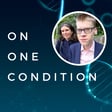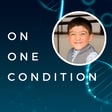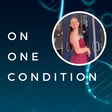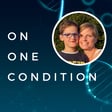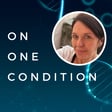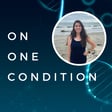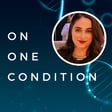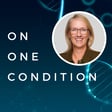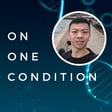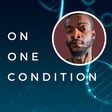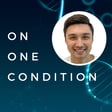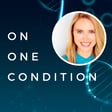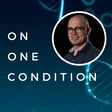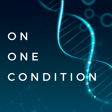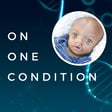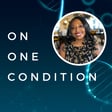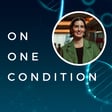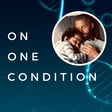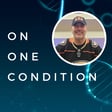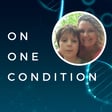Become a Creator today!Start creating today - Share your story with the world!
Start for free
00:00:00
00:00:01

Episode 34: Danielle Drachmann - Ketotic Hypoglycemia
Danielle's journey with idiopathic pathological ketotic hypoglycemia started with her children's diagnosis, although she had it from a young age herself, but was mis-diagnosed. In this interview, we talk about how this rare disease affects her body. She describes the complexity of raising children with a strict diet, where food intake becomes source of anxiety for parents and child. We also discuss the impact patient advocates have in our world, and her contribution to an initiative by the European Parliament.
The song that Danielle chose is Nothing Else Matters by Metallica.
Transcript
Introduction and Guest Overview
00:00:00
Speaker
Hi, I'm Sylvain Bertolo, and you're listening to On One Condition, a podcast to raise awareness about health conditions by listening to people who live them every day. Today, my guest is Daniel Dragman, and we're going to talk about idiopathic pathological ketotic hypoglycemia. Hi, Daniel. Thanks for joining me. How are you doing?
00:00:22
Speaker
Thank you so much, Silvian, for inviting me for this podcast. It's such an honor. I'm very excited to be here today. So thank you so much for having me.
00:00:32
Speaker
Well, thank you. I've been waiting for this recording a lot because I've been following what you've been doing recently. You've been super busy with a lot of exciting things, so I can't wait to talk about that.
Daniel's Personal Life and Music
00:00:50
Speaker
But before we start, could you tell us which song you selected and why?
00:00:57
Speaker
Yes, definitely. So this has been my favorite song for quite some years, almost decades. My favorite song is Nothing Else Matters with Metallica. Oh, amazing. Why? Because this song reminds me of my childhood and my parents. And it reminds me of entering on summer holidays, driving to Italy with my family. And my family always listened to Metallica.
00:01:27
Speaker
And I absolutely love it. It makes me so peaceful. And it reminds me that I have lived a very privileged and happy life. So that's my favorite song.
00:01:39
Speaker
I love that. And I love that song as well. So I'm glad you brought it up.
Discovery of Hypoglycemia Condition
00:01:47
Speaker
So we've got a lot to talk about, but I'd like to start where it kind of started for you as well. So could you tell us how you realized that you had pathological ketotic hypoglycemia, please?
00:02:03
Speaker
Yes, definitely. So my family journey and my journey discovering that I suffered from this condition
00:02:12
Speaker
It was quite unique. I was 26 years old when I received the diagnosis, and I only did so because I had two children who were diagnosed with it. And after my second child was born and received this diagnosis, we had a very, very good doctor in Denmark who said, oh, that's really odd that you should have two children with such a rare condition.
00:02:36
Speaker
it sounds like it might be genetic. After some time, he asked me, so, Danielle, do you have any signs of quetzatic hypoglycemia? I was like, no, I do not. I just have ADHD. I only had some issues in my teenage years where I was diagnosed with bulimia.
00:03:00
Speaker
And then he was like, Oh, can you describe your symptoms now? And when I then described my symptoms of ADHD and bulimia, he was like, Hmm, that could sound like you're suffering from undetected hypoglycemia.
Managing Hypoglycemia and Related Symptoms
00:03:15
Speaker
And then they did some tests. They did a fasting test and I had blood work done. And then we realized that my memory issues and confusion, all of my symptoms actually, um,
00:03:29
Speaker
occurred because I had quixotic hypoglycemia. So I was the third in my family to be diagnosed. First, I had my son, my first born, he was diagnosed. Then my daughter, Savannah, who is the second oldest or my second child, then I was diagnosed. And now my baby, Sienna, who is now one year old, has been diagnosed. Okay, wow. So the whole family apart from your husband. Yeah.
00:03:58
Speaker
It's quite interesting what you said about what you thought were ADHD and bulimia actually being ketotic hypoglycemia. So then does it mean that you don't have ADHD? I was cured for my ADHD and bulimia when I started to manage my hypoglycemia.
00:04:22
Speaker
I became aware that I was overeating every time my blood sugar would drop. And I became aware that I got confused and forgot everything every time my blood sugar dropped. So today I'm wearing a continuous glucose monitor who will allow me before my blood sugar drops to a dangerous level. And I'm able to be very proactive with my diet so I can
00:04:47
Speaker
act before I get the neurological symptoms of quixotic hypoglycemia. Okay. How does hypoglycemia present itself for you?
00:04:59
Speaker
It's very different from person to person, but to me, it depends if it's the cathodic type or if it's solely hypoglycemia. So hypoglycemia is divided into two subgroups, the cathodic hypoglycemia, which is when you haven't eaten for X amount of hours, your blood sugar will drop and your fat burn will start to rise and you will develop ketones.
00:05:24
Speaker
That is the diagnosis. But a lot of these patients, including myself and my son, we have what is called reactive hypoglycemia too. And reactive hypoglycemia is caused by an overproduction of insulin because the blood sugar rise too fast and therefore it will suddenly drop because the insulin will go completely bananas and make
Pregnancy and Hypoglycemia Challenges
00:05:47
Speaker
the blood sugar drop. So when I have had, for example, in the morning, I have maybe had
00:05:54
Speaker
an incident of ketotic hypoglycemia, maybe because I didn't take my cornstarch in the night, which is what we are taking to maintain the blood sugar. So I will make up with a low blood sugar with high ketones and I will feel nausea. I will also shake a little bit on my hands and I will know that I need to eat because my blood sugar is low and my ketones are very high.
00:06:17
Speaker
What I would usually do before I got the diagnosis, I would eat a whole can of Nutella and then I would eat bananas and I would eat like a crazy person. Then my blood sugar would rise very fast and then it would crash and burn within a matter of sometimes minutes. So when I have the ketotic hypoglycemia, I feel nausea. I feel shaky, but when I have
00:06:46
Speaker
hypoglycemia without ketones because it has been reactive. The blood sugar will drop so fast that I will actually not notice it until the blood sugar is dangerously low and I have difficulty actually standing up. I had one of those incidents when I was pregnant with Sienna, who is now one year old. I jumped over my supper because I was working on a research paper
00:07:13
Speaker
So instead I focused on tucking in my children who were only Noah and Savannah at that time. Then I ate candy because I knew I need to have something. And then I just ate some candy and I was working on a research paper and fell asleep without taking my cornstarch. So a few hours later I needed to pee because I was very pregnant. I was in week 32 and I stood up
00:07:42
Speaker
And then suddenly I collapsed on the kitchen floor with a blood sugar of 1.7, which is dangerously low. And that hypoglycemia was non-ketotic. And when I think back about what I regret most,
00:08:02
Speaker
I guess that was the day I regret most because after my baby was born it was discovered that she had brain bleedings. These brain bleedings were noted to have occurred when she was
00:08:15
Speaker
in my belly when I was pregnant from week 30 to 34. So they believe her brain bleedings occurred because of my reactive hypoglycemia when I was pregnant, because I focused so hard on my research that I actually dismissed the fact that I was sick and I had a baby to care for. So I regret that so, so desperately. I wish I could take it back. But luckily today, she's without symptoms. Her seizures have stopped.
00:08:44
Speaker
and she's developing fine, but she was very, very sick when she was very little. That may have been very scary. It sure was. It was.
00:08:57
Speaker
So you mentioned your monitoring yourself, so your blood sugar. You mentioned diet. So is it something that you can control relatively easily with the right diet and your monitor or not?
00:09:14
Speaker
Well, it depends. So that is why we are calling it the ketotic hypoglycemia rollercoaster, because when you actually think you have managed it and you have identified what is triggering your ketotic hypoglycemia, suddenly it's changed. So for us, my family, we are very sensitive to heat and cold. So if it's too cold outside or if it's too hot, our blood sugar will drop.
00:09:42
Speaker
And I try to manage. I will say that the CGM, the continuous glucose monitor, is an immense help because it's alarming me when I believe I'm safe, I'm not. And the same for my children. We only have corn starch to manage the condition and modified corn starch, which is called glycosate.
00:10:07
Speaker
It tastes awfully. It's like eating glue. And then you should try to then afterwards have appetite to eat food. It's very difficult, actually so difficult that the most severely affected children, and I say children because it's very new that adults in the world are being diagnosed. So a lot of the children who are so, so severe, they have to have G-tubes in operated into their stomach because they simply can't digest or eat orally all of that cornstarch.
00:10:37
Speaker
Really? How are your children coping with it? Well, that's a really good question. When I
00:10:48
Speaker
entered this world, the medical textbook were outdated. So they were the only one, the only knowledge we had, because there were no patient organization before I entered this world. And in the textbook, it stated that it was a benign condition of the childhood. Idiopathic catatonic hypoglycemia simply was a part of being a child, and it was nothing to worry about.
00:11:13
Speaker
And it also stated that the children would outgrow it when they started school. So with Noah, we just waited for him to get older and start school. At the time where he was little, we had periods of time where we were admitted by ambulance once a week and he was restrained and he was forced to eat and he was punched so many times to get the ivy plates placed. So Noah,
00:11:43
Speaker
Noah was four years old until the doctor said we need to have a G2 place because he started to have eating aversions. He started to refuse food and we were simply not able to be parents because he knew that he was able to say no to food and then we would give him whatever he wanted.
Family's Coping Mechanisms and Trauma
00:12:02
Speaker
It was different with Savannah because Savannah was only 17 months when she was diagnosed.
00:12:08
Speaker
So the doctor said right away she needs a D2 because she's not able to understand that she needs to eat when the blood sugar is low. So Savannah have not had those traumatic experiences being held by doctors and nurses and being forced to eat. So we are seeing a lot of mentally issues and PTSD like symptoms in NOAA and we have worked intensively to
00:12:37
Speaker
to let him know that when he, for example, when they are playing out in the garden
00:12:43
Speaker
Every time a child is grabbing him, he will go crazy and push back because his body remembers those restraints at the hospital where with Savannah, she did not have those traumatic experiences. So we are working with it constantly and we are learning how to work with childhood trauma, but it's ever evolving and they can never let go completely because the disease will follow them
00:13:13
Speaker
maybe forever, hopefully we will find a cure one day, but learning to cope and learning to live and not just survive, that is what we are balancing currently. It sounds terrible for Noah. I'm so sorry to hear that. Was he refusing food because of the feeling that you said that you feel nauseous?
00:13:42
Speaker
Yeah, so luckily Noah, he loves food. But Noah was a little, little baby, a little child. And he very quickly learned that mom and dad were very uptight and anxious every time it was dinnertime. And he learned that if there was something that he wanted, then he could simply say no to food. We would give him the toy or whatever he wanted, and then he could eat the food.
00:14:12
Speaker
And then after we really identified how severe the hypoglycemia was and he was able to start the cornstarch treatment, we were trying to somehow tell a child, you need to eat something that tastes like glue, otherwise you will end up in the hospital and they will poke you and do all these horrible things to you.
00:14:35
Speaker
So it was like all of the eating, the eating became medicine and he became terrified that we would force him to do something that both tasted horrible, but also that we were simply, we were threatening our child. Like how can that ever be healthy? But we simply did not have any, we were taken hostage by a three-year-old because of the condition.
00:15:03
Speaker
And we knew that if he did not eat, we had to call an ambulance. How do you even parent in that situation? How do you even get a child disciplined? When he was stabilized and he started to go into kindergarten, we really saw that the biggest disability this disease had really caused was the fact that we were simply not able to discipline and
00:15:32
Speaker
and educate our child about social norms and etiquette and how do you actually manage to go out in the real world with other people because he had been like nursed and kept in a concrete bubble and we would jump every time he said jump because we just needed him to eat. So that started out with our best intentions. We really just tried to make him survive, but we almost made him
00:16:00
Speaker
disabled and because of the fact that we never told him that in the real world, there could actually be consequences to your actions. Yeah, it sounds tricky and I guess from a three-year-old point of view, it's things that you don't understand. What's his relationship with food now?
00:16:23
Speaker
He loves food. Noah loves food and his body remembers what happened to him and he has some memories of what happened. But it's not like it's consuming his everyday life. I would say that we still struggle. He is hoarding food.
00:16:44
Speaker
So he's hiding food underneath his pillow, just in case what if I feel sick, I have to eat, I have to eat constantly. So, so it's still a struggle and we try to manage and balance and figure out because the food will forever be his medicine. But there is also
00:17:04
Speaker
research showing that for those children where the food is the medicine, there is an increased amount of children who will suffer from eating disorders, both some being very restricted about what they eat and some others who are overeating. So we are trying to find a balance and we are very fortunate to have great experts who are working with us on this.
Advocacy and Patient Organization
00:17:29
Speaker
And now I'm also very vocal about it.
00:17:31
Speaker
soon as we find food, he's like, but what if I get hungry? And then we have to remind him that the food can also be in the fridge, he can always get it. So reassuring him that he will not starve. And to be honest, it's really amazing how smart a little child can be. He knows that the hypoglycemia will make him feel sick
00:17:53
Speaker
So he's trying to prevent it to have storages of food in his bed. And I'm like, he's such a smart little boy and he's such a survivor. I'm so proud of him.
00:18:04
Speaker
It's incredible how children adapt more easily than adults in a way. I've been amazed through this podcast hearing how people adapt when they're facing a specific condition or situation from the young age.
00:18:25
Speaker
So you've been doing a lot of advocating and following what you do, you're on an incredible path and it's very good to see. Why did you feel the need to advocate?
00:18:47
Speaker
Well, I guess I didn't feel a need. I felt like if I did not, my child would die. So it was simply a question about life and death. That was how I felt when I started. The organization was created after we received the diagnosis of idiopathic cathodic hypoglycemia on nowhere. And my children's doctor said that
00:19:15
Speaker
idiopathic meant that we did not find a cause. And when we did not find a cause, there would not be a cure. And then he encouraged me and said, Daniel, if we're ever going to figure out what is wrong with him, we need to have bigger data samples. So you need to unite the patients and the families. So we have a bigger group of patients to investigate. And at the time, Noah was really sick with infections in his G-tube.
00:19:43
Speaker
And at a point where we thought, maybe we have to take it out because the infections are so severe and he's constantly on antibiotics. But we also knew that he was not able to manage his conditions without the G-tube. And I was like, what is the next? There is no next. There is no plan B. What can we do here?
00:20:02
Speaker
So when I started the patient organization, I was like, I need to have the best minds in the world united here. And then I need to have a big data sample so they can figure out what's wrong with them and find a cure. And that started my, uh, journey in patient advocacy, which at the time solely focused on idiopathic cathodic hyperglycemia. Later on, uh, we were able to initiate research in the patient organization.
00:20:32
Speaker
and I was very fortunate to work with some of the best hypoglycemia experts in the world.
00:20:38
Speaker
And these experts and the families inspired me to see, okay, maybe we do not have funding. We might not have a solid infrastructure. We are actually just overworked parents and caregivers and doctors, but we are so passionate about this and we are able to identify patterns in the Facebook support groups, which is now hosting more than 2,100 families from 90 countries.
00:21:05
Speaker
for sharing their narratives. And these narratives, they are so powerful and suddenly we were able to identify those patterns and we were able to rewrite the medical papers and we were able to publish new papers reflecting the reality of the families in these groups. So we started on idiopathic catotic hypoglycemia
00:21:31
Speaker
Thanks to the work of these amazing families and the medical experts, we have now divided this condition into two subgroups.
00:21:39
Speaker
the idiopathic pathological ketotic hypoglycemia, meaning those children who are so sick that they cannot fast for a few hours without having low blood sugar and high ketones. And then the physiological ketotic hypoglycemia, which is the benign part, which is maybe the normal variation of childhood, the child who would get low blood sugar and high ketones after vomiting for three days.
00:22:05
Speaker
that can be a very normal response to illness and to fasting. But before the organization was established, it was like all of these patients were united and piled up within the same group and the doctors were not able to differentiate between the normal form of ketotic hypoglycemia occurring while your child is sick.
00:22:27
Speaker
the very pathological and dangerous form of of idiopathic pathological cathodic hypoglycemia where the children often need G-tubes and an extensive management plan to simply get through the day. Yeah. So that started my advocacy and then it sounds like I don't know how it ended that way but
00:22:47
Speaker
I started to advocate for rare diseases in general because I became very mesmerized by the amazing work that was actually happening in these communities.
00:23:01
Speaker
I realize that this amazing work is done by necessity because we simply do not have the funding or the infrastructure. We often do not have the medical experts right by our side like we would have if the child would have diabetes. But we need to like scramble and find those few experts in the world
00:23:21
Speaker
trying to encourage the experts to take on additional work to really push forward, to find a cure or just to simply create awareness about a condition that no one has heard of. Yeah. I am so honored to be a part of the rare disease communities, but I'm also heartbroken to see how they are working themselves half to death because there is no one else supporting the community.
00:23:50
Speaker
No, you need a lot of passionate people who think about others before they think about their own time. It's humbling to see, but at the same time, the struggle for funding is such a downside of the research industry in a way.
00:24:18
Speaker
Are there any fundings now? Is there any research happening? Well, yes and no. We have just applied for the Rare S1 grant from the Chan Zuckerberg Initiative, which is an amazing initiative by the founder of Facebook and his wife, who are trying to support sustainable research networks within rare disease patient organizations.
00:24:47
Speaker
So the organizations are able to apply for funding to really boost their capabilities of creating a sustainable research framework within the patient organizations.
00:25:00
Speaker
So we just applied for that and we're really hopeful that we will get it. So we will be able to conduct much more patient-driven research and strengthen our organization. And then we are hopefully kicking off a fundraising campaign in Denmark where we hope to gather just some funding so we can unite some of the medical experts and the families again. We try to host conferences once a year or once every second year.
00:25:29
Speaker
where we unite the families and the medical experts.
00:25:33
Speaker
but it's very costly to fly experts from the United States to Denmark and the other way around. And hopefully shortly we will have a new member of our scientific advisory board all the way from China. So it requires quite some amazing parents who are good at getting sponsorships in-house, but we are really hopeful that the efforts will result in more collaborative research between the families and the medical experts.
00:26:03
Speaker
Yeah, it sounds like you've already made progress. As you said earlier, you've been contributing to rewriting papers. Yeah. But then it makes me wonder, okay, so you managed to gather all those voices from parents, patients. Yeah. How were those papers written before if it wasn't based on actual patient stories?
00:26:28
Speaker
Well, I guess before it was based upon the knowledge that you had as a physician, when you saw the patient in the ER, you would see a child who would be vomiting and having low blood sugar and high ketones, but also a strep infection or a stomach virus. And you would see that a child would recover after the disease or the virus had disappeared or after getting IV fluids. And
00:26:56
Speaker
They were based upon the experience from those experts who saw the child in the ER. And luckily today, we have been able to differentiate because of the large group of patients we have united in KHI.
00:27:16
Speaker
And we have had medical experts who has also been very open to change their opinion, to actually see that these stories from these families, that's actually valid. And we need to acknowledge that these patients exist. And even though we do not have the answer to why they have catatonic hypoglycemia,
00:27:39
Speaker
even though we have tried clinically and genetically to find answers, it does not mean that there is not a problem and they are not sick. It simply means that the science had not caught up yet. So we are really fortunate to have medical experts who have been very open-minded and listening to the narratives of the families at these conferences. So it was actually on the conferences
00:28:04
Speaker
that we saw that the stories of the families had most impact. We created patient stories as small videos where the families were showing their case, how the child presented before diagnosis and after, and the experts said, wow, that's not normal.
00:28:22
Speaker
that should be considered a severe pathological metabolic inborn era of metabolism. There is an issue here. And thanks to the voices and the families being so brave that they're sharing their story, even after they have been dismissed by doctors for years, we are seeing that this perception of idiopathic catotic hypoglycemia is slowly changing.
00:28:49
Speaker
So it's both about advocating, getting the families to dare to speak up and share their stories, but also the medical experts who are adapting to the new knowledge that is now being presented to them.
00:29:03
Speaker
It feels like you're at the beginning of science actually paying attention to this condition. So I'm sure there's still unfortunately a long path ahead of you, but at the same time, you seem to be doing so many different things to raise awareness. That's amazing. Thanks.
00:29:23
Speaker
You were recently talking to the European Parliament.
Proactive Healthcare and Wellbeing Economy
00:29:31
Speaker
Could you tell us more about that? I'm very intrigued about how you got involved.
00:29:37
Speaker
Yeah, of course I can. That was such an honor to be invited. I have been blessed to have amazing people in my network who have followed my advocacy work just like yourself. And I was contacted by European Parliament member, Penny Levice,
00:29:58
Speaker
who requested a patient advocate or an expert within rare diseases because they were doing a hearing on Rare Disease Day about rare diseases and the need for a political action plan to ensure the voices of rare disease patients in Europe are being heard.
00:30:17
Speaker
And after, I guess it was a few weeks, I got a call that they would like to formally invite me to this hearing, where I was so honored to join alongside the Eurodes CEO Jan Lekam, who I know from some of the political advocacy work I have done together with Eurodes. And
00:30:42
Speaker
That was one of the first time where I was really representing the whole rare disease community and not solely my specific field. And one of the points that I really wanted to make was the urgent need we have for expanded newborn screening across Europe. And I was telling them about how can it be that in Malta you have to bury your child
00:31:11
Speaker
who has a rare condition but in France or in Italy, you will be able to have a child who do not have any complication of the disease because it was caught by newborn screening.
00:31:25
Speaker
So it was really a big, big honor. And I was so touched to also see the reaction from the European Parliament members after my speech and honored to also present with Jan. I'm kind of starstruck with Jan. He's such a superstar and he has done such amazing work for the Redisys communities, not only in Europe, but in the whole world. So yeah, I still smile every time when I think about that I was invited on something with Jan.
00:31:57
Speaker
Well, it sounds like you've deserved it. Thank you. Thank you so much. And the speech, that was really good. And I must say that that was not written entirely by myself. I have like this mastermind of communication. That's my big brother. Nicholas is my big brother who lives in Australia. And when I started this journey of patient advocacy, I did not speak English at all. And I was
00:32:24
Speaker
very, very new to communicating anything.
00:32:29
Speaker
As time has gone by, I have learned to speak English and I have learned to articulate myself in a proper manner, but still when there is something big happening, I always turn to Nicholas and I'm like, Nicholas, we need to get a message across and I can't screw it up. So please, please make sure that this comes across properly. And also he did with this presentation and he is, he's truly to thank for a lot of the amazing accomplishment we have done in this field.
00:32:58
Speaker
Nice. Family affair then. Yes, it is. Yes, it is. It's incredible how you can have the same message communicated well or communicated badly. Exactly. It's not going to come across if it's not communicated well. What impact do you expect this hearing from the European Parliament to have?
00:33:23
Speaker
I hope that with that presentation, rare diseases are being considered as something that is relevant to all citizens in Europe and not only those who are affected by it. So rare diseases are not rare. One in 17 in Europe are going to be impacted by a rare disease during their lifespan. And I also hope like from
00:33:51
Speaker
From an economic perspective that they will see, it does not make sense to not check for it because you might have a person who will require extensive medical care throughout their lifetime if it's not diagnosed properly early.
00:34:09
Speaker
Just an example with hypoglycemia, well, just one attack of prolonged and undetected hypoglycemia can cause irreversible brain damage. Well, if we caught it early, that will not happen and that person will be able to maintain themselves for the rest of their lives. We also have ethical obligation to, we do have the tools to test for this. It's simply not okay.
00:34:38
Speaker
to leave these families in despair simply because we did not prioritise it when we were creating the non-existing action plan on a European basis.
00:34:49
Speaker
Yeah, it's interesting because it's a change in mindset. You either address what you see when it happens or you try to prevent it or to give people the tools they need to manage it. Yeah. And we're not seeing... I mean, it's very good to hear that the European Parliament is listening.
00:35:15
Speaker
But it takes a lot of effort to change mindset and to change how we treat patients. And I also think that it's misleading to call it healthcare. Today, it's sick care. We only focus on it when it has turned out wrong and when something has been dropped and the disease has happened.
00:35:37
Speaker
If we instead think about our economy in European countries as an economy of wellbeing, focusing on preventing disasters from happening, I believe we would see a rise in not only wellbeing, but also in the economy.
00:35:57
Speaker
I'm writing this down. I love it. Economy of wellbeing. Yes, it's actually a movement. So in Denmark, I was working with the Danish Committee for Health Education establishing the wellbeing economy network in Denmark, but we are seeing it all over the world. It's simply a movement of alliances, trying to create political awareness about how we need to change the mindset from the mindset.
00:36:27
Speaker
set of sick care to health care and actually an economy of well-being and how it's going to affect not only health and economy but also sustainability and the whole world in general if we start to prevent the diseases from happening and not solely sitting back thinking about the budget from calendar year to calendar year.
00:36:52
Speaker
Yeah, I fully agree. And that's the perfect message to finish on for today. Thank you so much. Thank you, Danielle. I mean, it's been an incredible journey you've been on. It's still going on and I wish you the best in this journey.
Finding Peace in Work and Family
00:37:10
Speaker
I love finishing by the same question to everyone. Oh, yes. What's your happy place, a place where you feel at peace? Well, I have two places currently.
00:37:22
Speaker
One place is when I am opening my computer and I know that now I have eight hours of uninterrupted time to work because I love my work. I work at the Thermo Fisher Scientific. I work in a small CRO required by Thermo Fisher called Evidera. And we are doing patient engagement and patient centered science.
00:37:48
Speaker
I love my work, but I also love when I close the computer and I go out to my family and I get a hug from my children and a kiss from my husband and I get to breastfeed my little baby who's not so little anymore. So all in all, I'm the most privileged person in the entire world because I love my work and I love my life.
00:38:08
Speaker
Well, that's amazing. So it's being at home doing what you love every day. Yeah. Incredible. Well, Danielle, thank you so much. It's been an honor to talk to you. It's been really worth the wait. I'm so glad that we managed to get this time to talk to each other. Thank you so much for your time. And I really wish you all the best for the future.
00:38:37
Speaker
Thank you so much and thank you for inviting me. I'm still so honored. Thank you for the great work you're doing.
